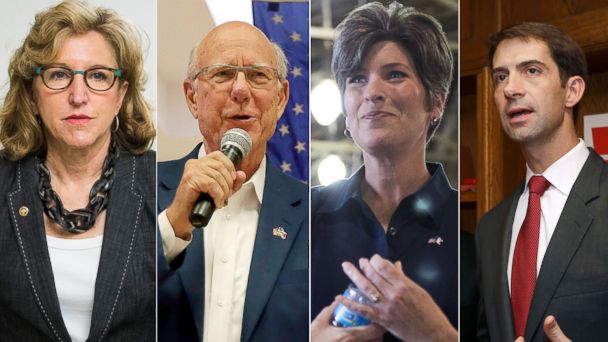Midterm Elections: In Search of a Theme

Getty Images | AP Photo
Just one month before the November elections, the fate of the U.S. Senate isn't the only thing that's up in the air - so is the theme of this year's midterms.
Pundits and politicians have been searching for a unifying idea for months. First it was the Republican-inspired government shutdown. Then the botched rollout of the Obamacare website. Then, perhaps, immigration reform (or the lack thereof.) Then the disquieting state of international affairs, led lately by the U.S.-fronted campaign against ISIS.
But now, with the midterms around the corner, it's possible no single defining issue will emerge.
One thing we do know: The state of the economy is still crucial. Thirty-five percent in last month's ABC News/Washington Post poll, a plurality of Americans, single out the economy and jobs as the single most important issue in their vote for Congress - just off the four in ten who did the same in 2010, as the United States was struggling, even more mightily than now, to emerge from the Great Recession.
Historically, the economy often is the top issue for a plurality of Americans. But - unless the economy is overpoweringly awful, or the nation's entangled in an unpopular war or other, particular crisis - other issues often share the limelight.
In 2002, a bit more than a year after the September 11 attacks, 28 percent in ABC/Post polling picked the economy as the top issue in their vote, but two in 10 cited terrorism and 12 percent said it was the situation in Iraq. Heading into the 2006 midterms, three in 10 said the unpopular war in Iraq was driving their vote; only two in 10 picked the economy. And in 2010, when Obamacare had just become law, 18 percent said health care was their top issue, second to the economy.
But there's no clear second-place issue this year. The way things are working in Washington, health care, international conflicts and immigration clock in at 15, 13, 12 and 10 percent, respectively. (Question items differ by year in the polling we're describing.)
Still, this year's data highlight some notable nuances within this year's electorate. People under age 50, who have years of work ahead of them in the still-struggling economy, are more apt to be focused on the economy and jobs (44 percent) than those over 50 (28 percent) - a 16-point gap, compared with just 3 percentage points in 2010. And, though not a new trend, nonwhites and Democrats also are more likely to consider the economy first and foremost.
Meanwhile, those with lower socioeconomic status are more apt than their counterparts to focus on health care. People making less than $50,000 and those without a college degree are 6 points more likely to select healthcare as their most important issue compared with their counterparts, who seem to have moved on from the issue since 2010. (Similar to the last midterms, women are twice as likely as men to cite health care as a top priority, 17 vs. 8 percent this year).
A sizable number of independents have turned to "the way Washington is working" as an impetus for their vote: Twenty-one percent of independents - 9 points more than in 2010 - put their focus on DC's inner workings, compared with 12 percent of others. But this discontent is less of an advantage for the GOP than four years ago. In 2010, those who selected the way D.C. works as their top issue in our pre-election polling backed Republican House candidates by a 24-point margin. Today that group splits almost evenly.
Additionally, those older than 40 and whites are twice as likely as their counterparts to select how Washington is working as their top issue (18 vs. 9 percent and 18 vs. 8 percent, respectively). In 2010, by contrast, there were no such divisions among these groups.
As we come down the stretch, these differing priorities make it increasingly unlikely that election analysts will get the one central theme for which they've been searching. But hey - there are four weeks left.